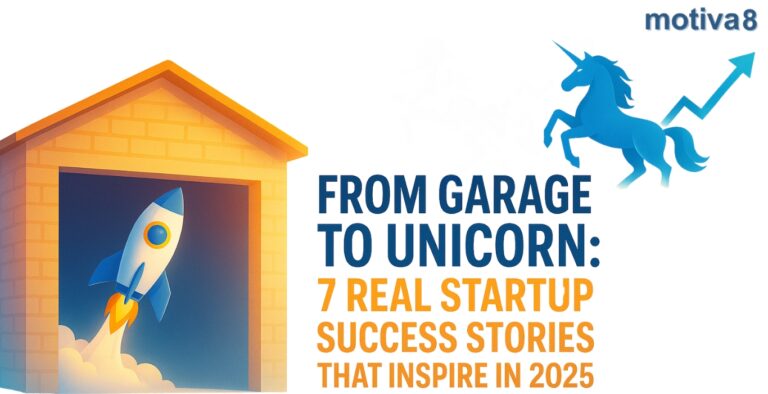
Have you ever wondered how today’s billion-dollar startups began? The phrase “from garage to unicorn” isn’t just a cliché — it’s a reality for many of the world’s most disruptive companies. In 2025, the startup ecosystem continues to prove that big dreams, bold execution, and relentless grit can take a humble beginning and turn it into a global success story.
This blog takes you behind the scenes of 7 powerful startup journeys that began in garages, bedrooms, and basements but ended up as unicorns — startups valued at over $1 billion. You’ll discover what made them succeed, what challenges they overcame, and what aspiring founders can learn.
Let’s dive into the real stories that prove you don’t need a fancy office to build a billion-dollar business — you just need the right mindset.
1. Apple: The Garage That Started a Tech Revolution
Founded: 1976
Unicorn Moment: Went public in 1980 at a $1.2 billion valuation
Now Worth: Over $3 trillion
Steve Jobs and Steve Wozniak famously built the first Apple computers in a small garage in Los Altos, California. Their story is the blueprint for startup mythology: limited funds, visionary thinking, and relentless hustle.
Key Takeaway:
A simple idea — if executed brilliantly and obsessively — can change the world.
2. Amazon: From Online Bookstore to Global Giant
Founded: 1994
Garage Location: Bellevue, Washington
Unicorn Milestone: IPO in 1997 with a $438 million valuation
Today: The world’s most customer-centric company
Jeff Bezos started Amazon to sell books online. What he really built was an ecosystem of logistics, tech, and customer obsession. He reinvested profits, prioritized long-term thinking, and revolutionized eCommerce.
📊 In 2025, over 60% of U.S. consumers begin product searches on Amazon.
Lesson for Founders:
Think long-term. Scale in phases. Serve customers like royalty.
3. Google: Code, Coffee, and Dorm-Room Ambitions
Founded: 1998
Started In: Susan Wojcicki’s garage
Unicorn Leap: Became a $23 billion company by 2004 IPO
Impact: Changed how the world accesses information
Larry Page and Sergey Brin didn’t set out to build a company — they wanted to organize the world’s information. Google’s relentless focus on product performance and user experience turned it into the world’s go-to search engine.
Key Insight:
Start by solving a real problem at global scale with obsession-level focus.
4. Dropbox: Solving a Simple Problem with Massive Reach
Founded: 2007
Founder Story: Drew Houston created Dropbox after forgetting his USB
Garage Equivalent: MIT dorm room
Valuation at Peak: $10 billion+
Dropbox proved that a small pain point, when addressed elegantly, can reach millions. With a simple explainer video, a beta waitlist, and word-of-mouth, Dropbox grew organically to 1M users in just 7 months.
Takeaway for Startups:
Start small. Validate early. Let your users guide product evolution.
5. Spanx: A Solo Female Founder’s Billion-Dollar Hustle
Founded: 2000 by Sara Blakely
Initial Capital: $5,000 from savings
Unicorn Status: Reached $1B valuation without outside funding
Spanx began in Sara Blakely’s apartment with a single prototype and unmatched drive. She cold-called manufacturers, hustled into stores, and built a brand without a marketing budget — just grit and belief.
👠 She became the world’s youngest self-made female billionaire.
Inspiration:
No tech, no VC, no co-founder. Just vision, perseverance, and self-confidence.
6. Airbnb: Three Air Mattresses and a Big Idea
Founded: 2008
Started In: A San Francisco apartment
Initial MVP: Renting air mattresses during a conference
Unicorn Status: Reached $1.3B by 2011
Airbnb was born out of a rent problem — literally. Brian Chesky and Joe Gebbia couldn’t afford their apartment, so they rented out floor space. What they built was a revolution in travel, trust, and community.
Key Insight:
Great startups solve urgent problems and tap into underutilized assets (like spare rooms).
7. Flipkart: India’s E-commerce Giant with Humble Beginnings
Founded: 2007 by Sachin and Binny Bansal
Started In: 2-bedroom apartment in Bangalore
Initial Model: Online bookstore
Unicorn Status: $1B valuation in 2012
Before Amazon dominated India, Flipkart was delivering books using scooters. With relentless focus on logistics and customer service, they scaled into India’s e-commerce behemoth, eventually acquired by Walmart for $16B.
🇮🇳 Flipkart proved that localization is the secret weapon against global giants.
Startup Tip:
Understanding your market’s unique needs is a massive competitive advantage.
The journey from a garage to a unicorn isn’t easy, but it’s more possible than ever. With the rise of no-code tools, global talent access, micro-funding options, and rapid prototyping, your idea could be tomorrow’s headline.
The one thing these success stories have in common? They started. Whether you’re in a garage, dorm room, or tiny coworking space, now is the time to take that first bold step.
Build relentlessly. Think long-term. Focus on users. That’s the formula behind every unicorn story.